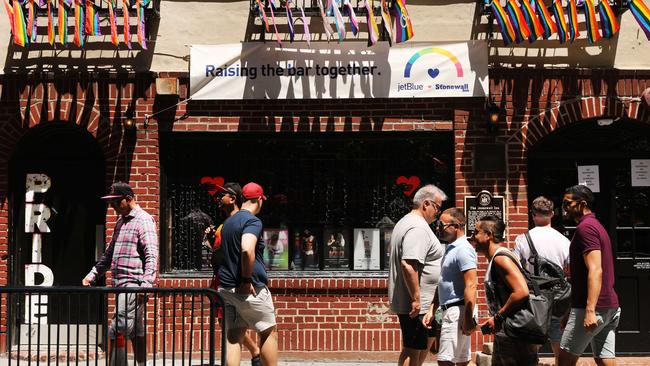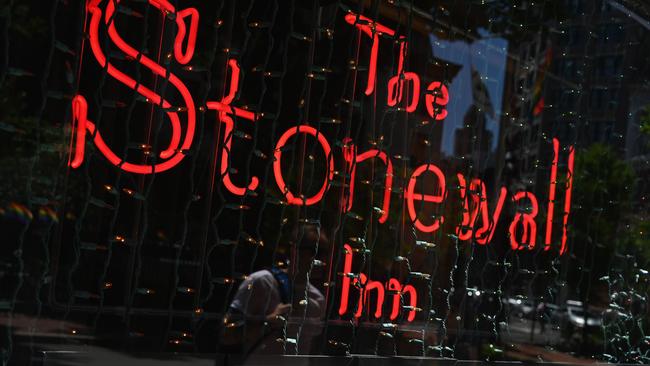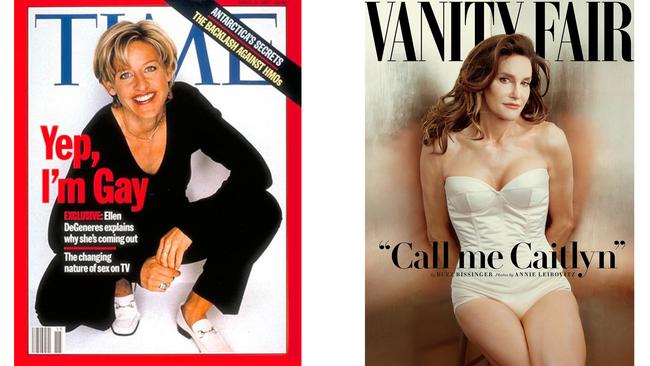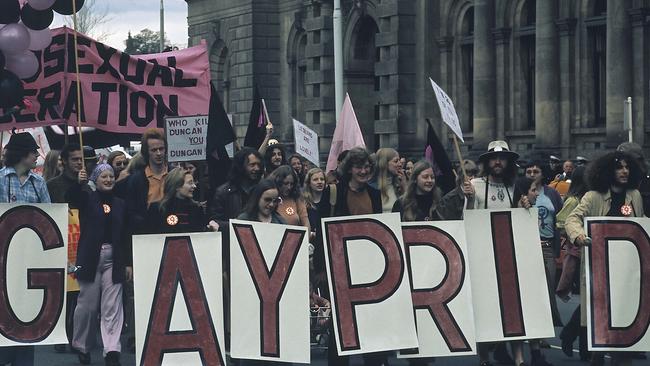Stonewall 50th anniversary: How a gay bar riot changed the world
On the 50th anniversary of New York’s Stonewall riots, more people than ever before are ignoring the hellfire warnings from the likes of Israel Folau, and living happy, open, truthful lives, writes David Mills.

Rendezview
Don't miss out on the headlines from Rendezview. Followed categories will be added to My News.
Camille Paglia once described homosexuality as “the minority taste, and always will be”.
Yet 50 years on from the Stonewall riots — when New York gay bar patrons fought against police harassment over three successive nights — that minority has some serious size and heft.
Consider Australian census data: the ABS counted some 9000 same-sex relationships in the 1996 census, and that figure increased fivefold to 46,000 couples by the time of the 2016 count.
MORE FROM RENDEZVIEW: Why I took action on Folau
More telling was La Trobe University’s recent report into the inner lives of Australian high school students, which revealed 5.6 per cent of respondents were solely attracted to members of their own sex, and a further 11.2 per cent said they were attracted to people of both sexes.
Just over four per cent said they were undecided who they were attracted to.
This leaves almost 79 per cent of survey respondents who said they were attracted solely to members of the opposite sex — an overwhelming majority, to be sure. But at the same time, the La Trobe data suggests Alfred Kinsey’s famous estimate that one in 10 people would engage in a homosexual act at some point in their lives might need a 21st century update.

The La Trobe researchers asked about sexual attraction, rather than activity, and were careful to point out the online nature of their survey may have led to an over-representation of same-sex-attracted teens in the cohort. But they also argued their numbers “may indicate an increased number of young people prepared to come out as experiencing same sex attraction”.
The question arises: why?
There are many reasons but the increasing presence of openly lesbian, gay and bisexual people, both famous and everyday, must have a profound effect on young adults exploring and establishing their own identities.
MORE FROM RENDEZVIEW: Mardi Gras started as a protest movement, so do we still need it?
And in the past generation or so, a funny thing has happened: pretty much every celebrity who was ever suspected of being gay or lesbian has now come out.
Of course, there are a few exceptions (looking at you, Mr Handsome Australian TV Star) but consider the names: Ellen DeGeneres, George Michael, Ricky Martin, Jodie Foster, Anderson Cooper, Lily Tomlin, Barry Manilow, Kristen Stewart, Cynthia Nixon, Rosie O’Donnell, Ian McKellen, Neil Patrick Harris, Jim Parsons, even Kevin Spacey (ugh); in every case the talk turned out to be true.

A similar shift happened in Australia. Ian Thorpe, Magda Szubanski, Darren Hayes, Anthony Callea, Dawn Fraser, Raelene Boyle, Penny Wong, Michael Kirby … all have come out, or at least acknowledged past same-sex relationships, in the last 20 years.
MORE FROM DAVID MILLS: What Prince Philip’s car crash revealed about the royals
While each of these coming-outs has been duly reported, their cumulative effect cannot be underestimated.
For today’s young people, there are ‘out’ role models in most fields of public life, whereas before there was only rumour and supposition.
Of course, Stonewall is celebrated not just as the first defiant act of visibility from the homosexual community but also from the trans community and the strides forward in this area have been momentous.
The stories of Caitlyn Jenner and the Wachowskis internationally and Cate McGregor and Andreja Pejic in Australia, have inspired other people’s lives in ways we cannot possibly calculate.

As the 50th anniversary of the Stonewall riots arrives, homosexuality and gender diversity might seem to be more accepted than ever, but they remain far from being universally loved, as the current Israel Folau slug-fest proves. It’s an awkward fight, touching on many issues at once — freedom of speech; religious freedom; the increasing control employers have over our lives; censorship; but also the right for people to exist without being harangued, humiliated or harassed, simply for being who they are.
If the La Trobe data is any indication, two generations on from Stonewall, more people are happy to call themselves something other than straight than ever before. It is a remarkable outcome, one which those rioting New York bar patrons never envisaged, or planned. All over the western world, an increasing number of people are shrugging off the predictions of damnation promulgated by the likes of Mr Folau, and saying to hell with you, mate … we’ll live as we want.
If that’s not cause for celebration, I don’t know what is.
David Mills is a News Corp Australia journalist.
Originally published as Stonewall 50th anniversary: How a gay bar riot changed the world


